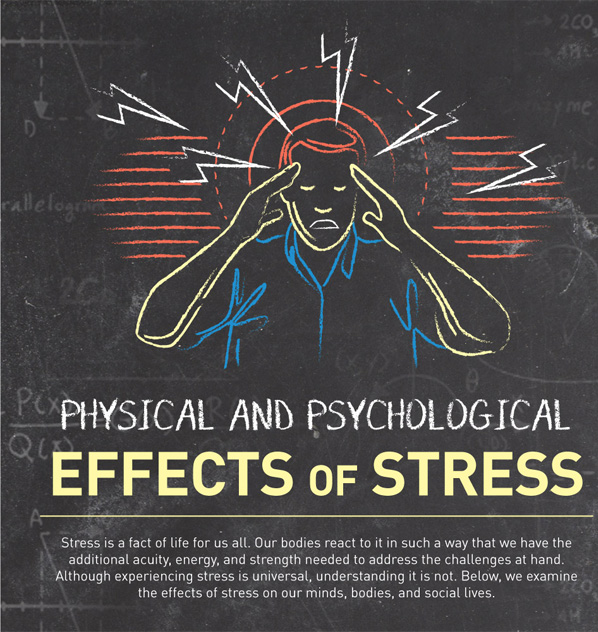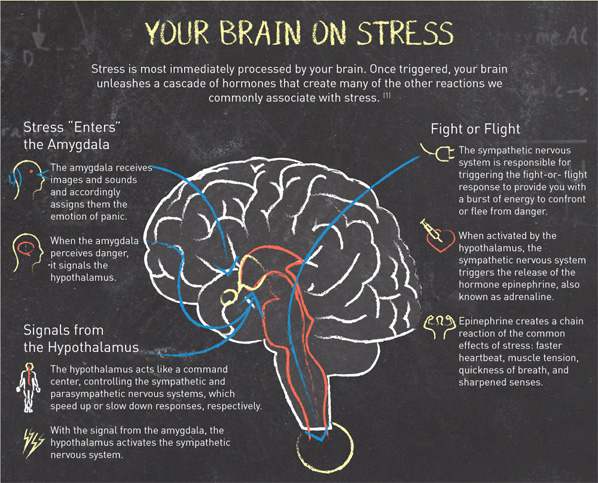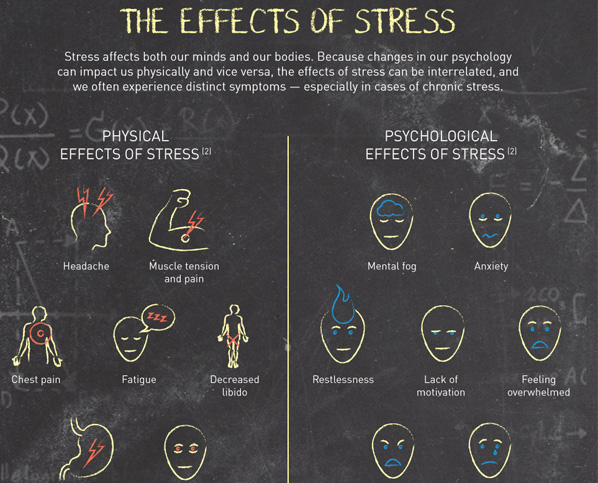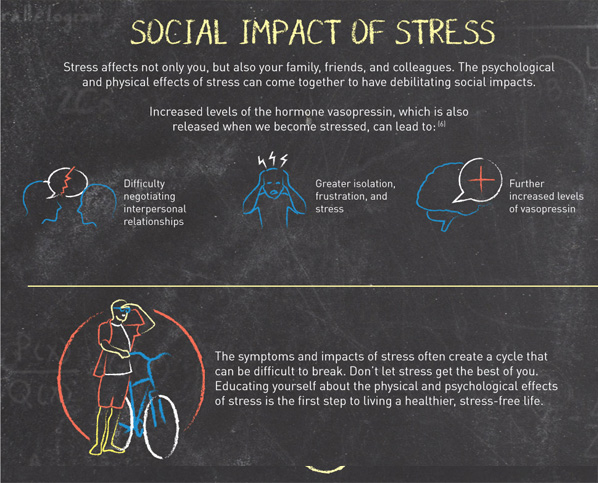When we have too much to do at one time, we become very discouraged. Instead of worrying about what should be done, just say: “This hour is mine. I will do the best I can.” The clock cannot tick twenty-four hours away in one minute, and you cannot do in one hour what you can do in twenty-four hours. Live each present moment completely and the future will take care of itself. Fully enjoy the wonder and beauty of each instant. Practice the presence of peace. The more you do that, the more you will feel the presence of that power in your life.
Try to remain for one minute at a time without thinking negatively, fixing the mind on the peace within, especially if worried. Then try to remain for several minutes with a quiet mind. Following that, think of some happy incident; dwell on it and visualize it; mentally go through some pleasant experience over and over again until you have forgotten your worries entirely.
By Paramahansa Yogananda
To an extent, stress is a fact of life for all of us. Its purpose is to overcharge the body, offering it additional acuity, energy, and strength needed to address the challenges at hand. However, stress can also be very taxing, and chronic stress is no joke. Below, we examine the effects of stress on our minds, bodies, and social lives.
So is there a way to get out of it? Yes there is and all you need is determination and the will to win over stress and use to achieve greater success in your lives.
“The data shows that small changes build up. When we notice ourselves making changes to feel better, we start to feel better,” says Natalie Dattilo, Ph.D., director of psychology at Brigham and Women’s Hospital’s Department of Psychiatry and a member of the American Psychological Association.
Dr. Datillo regularly uses the mnemonic “ESCAPE” to discuss mental wellness with her clients. The acronym stands for Exercise (an instant mood booster and stress reducer), Sleep (which helps your brain function at its best), Connect and Appreciate (because social connections and gratitude can foster better mental health), Pleasure (an important component of overall happiness), and Exhale (a powerful way to calm anxieties and reduce stress).
Here are some strategies which are the most science-backed ways to manage stress and emotions to promote better mental well-being.
Open up about something on your mind
Chat with a trusted friend or family member about stress you’re experiencing or a mental health diagnosis you’ve received. In addition to helping us to work through our problems, opening up a discussion around mental health is the first step to normalizing the topic. “It would be lovely to share what you’ve learned in therapy to reduce the stigma of seeking treatment,.” “We keep it a secret, which promotes stigma and shame. One of the worst things for mental health is feeling ashamed.”
Imagine your happy place
Picturing somewhere you love can make you feel relaxed and comforted. Get in a comfortable position sitting or lying down and close your eyes. Imagine a place where you feel happy, safe, and loved. It can be somewhere you’ve already been or a spot you’d like to visit but never actually have. Then fill that place with sensory detail. What colors do you see? Is it warm, cool, or soft? Who’s there? What does it smell like? What are you doing? Once you’ve found your happy place, go back any time you need a mental vacation.
Unplug for one hour
Maybe the news makes you feel out of control. Or maybe social media breeds FOMO(anxiety that an exciting or interesting event may currently be happening elsewhere, often aroused by posts seen on social media.).
These kinds of unhealthy distractions can make us feel worse, and even promote feelings of anxiety and depression. So consciously put down your phone and turn off the TV for one full hour to be present in the here-and-now. “Once you unplug, you’ll realize you’re not really missing that much.
Do five minutes of physical exercise
“Sweat therapy,” is one of the best ways to reduce stress and improve your mood—and the effects are immediate. Making time to regularly work out is an important long-term strategy for stress prevention and management. To enjoy the benefits, your workout has to feel effortful and intentional. This doesn’t mean you have to do HIIT or a 10-mile run every day; even a couple minutes of hard work does the trick. Try five minutes of exertion: one to two minutes of planks, one to two minutes of push-ups, and one to two minutes of squats or wall sits and see your mood uplift.
Go to bed an hour earlier
Research has shown that sleep deprivation increases stress and irritability, upping the risk of depression and anxiety. “Sleep’s greatest benefit is letting your brain unwind and recharge so it’s at its best day to day. Dedicate today to making seven to nine hours of quality sleep a priority.
Pay it forward
Buy coffee for the person behind you in line. Give up your seat on the subway. Open the door for someone. These gestures take little effort but can make a big positive impact on another person’s day—and your own. That sense of connection with others has been shown to enhance mental state and positive warm feelings.
Pledge to stop using stigmatizing language.
Terms we use every day, like “crazy,” can stigmatize mental health conditions. The words we choose reflect more on us. If the goal is to feel better about ourselves, how we communicate and what we say matters. Count how often you use words like ‘crazy,’ ‘psycho, Depressing’ bad’ shit’ negative words in your conversations. Then reflect on how this kind of language might be harmful to anyone who is suffering from a mental health disorder (including yourself), and the next time you’re tempted to use these words, think about a better replacement. (For example, instead of saying you had a crazy day, say that your day was hectic or super busy.)
Do a “brain dump”
“When we ruminate or worry, our brains are inefficient. We spend a lot of time focusing on solving a problem that may not be solvable. If you’re a worrier by nature, journaling can move your concerns outside of your head and onto the page. However, remember that journaling should be used to leave something in the past and move on. “While journaling can help if it lets you move forward, it can hurt if you use it to stay stuck,” she says. Which is why she recommends doing your brain dump on a piece of scrap paper and then recycling it to avoid fixating on your problems.
Set a reminder for a daily walk
Getting your blood flowing reduces the stress hormone cortisol and releases feel-good endorphins—plus spending even 20 minutes in nature has been shown to relieve stress. “Exercise is the best thing you can do for immediate stress relief,”. If you can’t leave your office in the middle of the day, do jumping jacks, take a lap around your floor, or walk up and down a couple flights of stairs.
Do a friend a favor
Doing a solid isn’t just selfless; it also boosts your mental health. Psychologists say that gift-givers actually reap more psychological benefits than recipients. “It helps you to feel purposeful,”. Offer to pick up a friend’s dry cleaning on your way home from work or babysit their kids. And if you can’t think of an appropriate favor, offer a loved one a little “just because” gift that you think they’ll enjoy. It’ll make their day—and yours, too.
Review your to-do list
Working long hours is a common trigger for stress, anxiety, and depression. Start your week by making a to-do list—or revisit the one you have—to figure out what really needs doing…and what can wait for later. You don’t have to finish everything, but it can be helpful to get tasks out of your head and onto paper. “Sometimes it’s about managing time, but often it’s about managing your energy and pacing yourself throughout the day,”. “You’ll start your day feeling productive and accomplished, which is sets you up for success. When we feel accomplished, we’re motivated to accomplish more.”
Plan your next getaway
Goal-setting helps you look forward while focusing on the present, which can improve your mood. “It keeps you from feeling stuck and overwhelmed. Even if it’s months away, it encourages you to keep going, because relief is in sight,”. Make a vision board of places you’d like to visit, browse your calendar for potential dates, or finally book that flight.
Say no at least once
Feeling overwhelmed by responsibilities is a powerful trigger for negative emotions. We all struggle to say no because it makes us feel guilty, and many of us are unsure of how to gracefully decline an opportunity. But saying no honors yourself. “What you’re doing is saying yes to the things you really want to do and yes to self-care,” . Try, “I’d love to, but I simply can’t,” or “I have to decline that opportunity today, thank you.”
Watch something that will make you laugh
Someone said “Laughter is the best medicine”, and that someone was absolutely right about it. Whether you’re watching a standup special, your favorite romantic comedy, or a sit-com, laughing is the ultimate stress-buster. “You can’t laugh and be stressed out at the same time. Try it if you don’t believe it.’
Listen to a friend
We all talk so much that many of us forget to listen. But listening is the best way to connect with others. Instead of trying to solve or diagnose a problem, offer to be available to a friend or family member to vent for as little or as much time as they need. To connect and understand someone else’s point of view is very good for your own mental health and well-being.
Try a breathing exercise
Focusing on your breath is a form of meditation that switches your parasympathetic system from fight-or-flight to chill-out mode. Get in a comfortable position, whether that’s seated or lying down. Concentrate on your breathing and slow it down, taking deliberate, even-paced inhales and exhales. If you want more structure, breathe in for five and out for five; experiment to find the count that’s comfortable for your body.
Find your go-to mantra
Unrealistic expectations (like the idea that anything in life can be “perfect”) feed negative self-talk, which increases feelings of stress, anxiety, and depression. Find a mantra that speaks to you, like, “I can do this,” “I am worthy,” “It’ll be okay,” “It will all work out,” “I am strong,” or “I got this.” Then write it on a Post-it and hang it someplace you’ll see it—your fridge, front door, or mirror. “The way we talk to ourselves affects the way we feel and what we do. When we use encouraging statements, we tend to feel better and are more productive.
Dabble in a hobby
What’s one thing you wish you could spend more time doing? Writing on your blog? Volunteering with animals? Learning a new language? Take an hour today to immerse yourself in whatever hobby gives you a boost. One of the biggest sources of stress and anxiety is life dissatisfaction, or feeling that we’re not passionate or purposeful. Doing something that gives your life purpose has been shown to greatly benefit your mental health, she adds. While loving your work is one way to feel purposeful, hobbies are another way to fulfill a passion.
Count in your head
If meditation seems daunting, try counting to bring your mind back to the here and now. “Counting is a great form of distraction, especially if you’re overwhelmed, stressed, overthinking, or worrying. It breaks you out of that cycle by refocusing on things happening in your environment. When you’re feeling stressed, take a look around you and identify five things you see and five things you hear—and, voila, you’ve meditated today!
Fix something that’s been bugging you
You’ve been meaning to take some jeans to the tailor, repair a door knob, or sort your files—but you just can’t find the time to tackle little tasks. Make it happen today. Address two to three little things that have been in the back of your head but on the back burner. You’re clearing out the clutter, both physically and mentally, so you can put more energy toward the things that are really important to you.
Hug your pet, partner, parent, or friend
Getting cuddly increases the bonding hormone oxytocin and decreases the stress hormone cortisol, which makes you feel more relaxed and happier. “People crave connection. It’s a critical aspect of wellbeing.
Note one thing you’re grateful for
Negative thinking is a slippery slope; negativity has a sneaky way spiraling out of control. Combat this cycle by taking a minute to jot down one thing for which you’re really grateful. Looking for a more advanced challenge? Find a reason to be grateful for something that makes you miserable, because it’s ultimately teaching you an important lesson. “Things that cause you stress present challenges, which teach you important skills like patience, resilience, and strength.With practice over time, you will begin to find appreciation for even the not-so-good things.”
THANK YOU !








Recent Comments